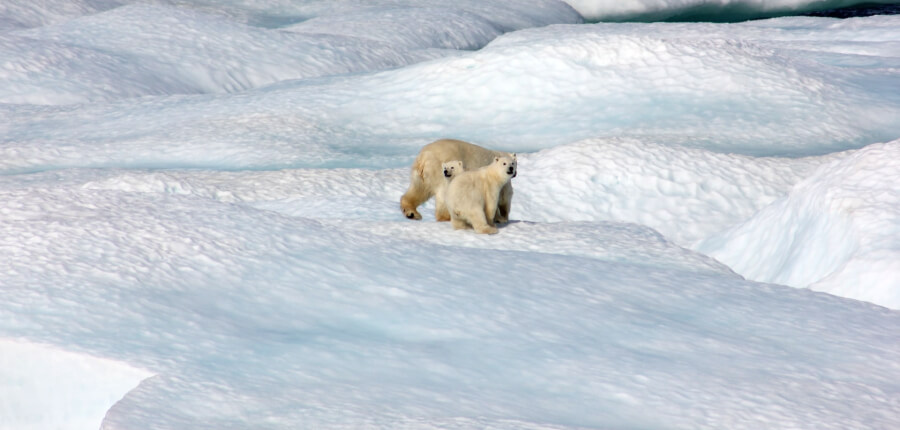In 2017, documentary filmmaker Jerome Bouvier followed two brother-and-sister polar bear cubs in the Arctic to find out how the climate catastrophe was affecting their ability to survive. Watching the documentary makes one thing abundantly clear: for polar bears and the planet, we must go vegan. Going pescatarian or vegetarian just isn’t enough to fix things now.
Here’s a look at Face to Face With the Polar Bear.
Bouvier explains, “As the sea heats up, the surrounding ice melts even faster, and the Arctic ice pack has already lost 40 percent of its thickness in as many years. It’s a vicious circle that threatens to become irreversible.” As the ice disappears, it becomes harder and harder for polar bears to hunt seals, which they depend on for survival. “Most polar bears don’t survive beyond their first birthday,” says Bouvier.
Animal agriculture is responsible for more greenhouse gases than all the world’s human transportation systems combined. And it includes killing fish for food. Commercial fishers use fuel-guzzling ships the size of football fields to track fish. The vessels can stay at sea for as long as six months and store thousands of tons of fish in massive freezers. The animals are then transported in semi-trucks to be processed in large factory slaughterhouses, and their body parts are packaged and shipped around the world.
Humans eat far more fish than any other animals, killing hundreds of billions of them a year. Ninety percent of large fish populations are now gone, even though humans can get all the nutrients they need without eating fish.
Fishers also kill and discard hundreds of thousands of birds and marine animals, including sea turtles, dolphins, sharks, seals, “nontarget” fish, whales, and others, as so-called “bycatch” every year. Shrimp trawlers discard 60 to 80 percent of their “catch.” The 700,000 tons of fishing equipment that are lost or left behind each year litter the ocean and kill even more.
"Fishing gear is designed to catch and kill marine life, and ‘ghost gear’—abandoned, lost or discarded fishing gear—is the most harmful form of marine debris for animals.” #seaturtle #education #awareness #protection https://t.co/PfeEp4gnME
— Save the Sea Turtle (@savetheseaturtl) March 23, 2018
Aquafarming isn’t the answer. The bodies of these fish are rife with contaminants, parasites, and diseases, and the chemicals and antibiotics that aquafarms use to treat them spill out into the ocean, killing animals and pushing some populations of salmon to the point of extinction.
The only way we can successfully stop the climate catastrophe and protect animals and the planet, including the oceans, is to go vegan. Our vegan mentors are ready to help you make the lifesaving switch.





